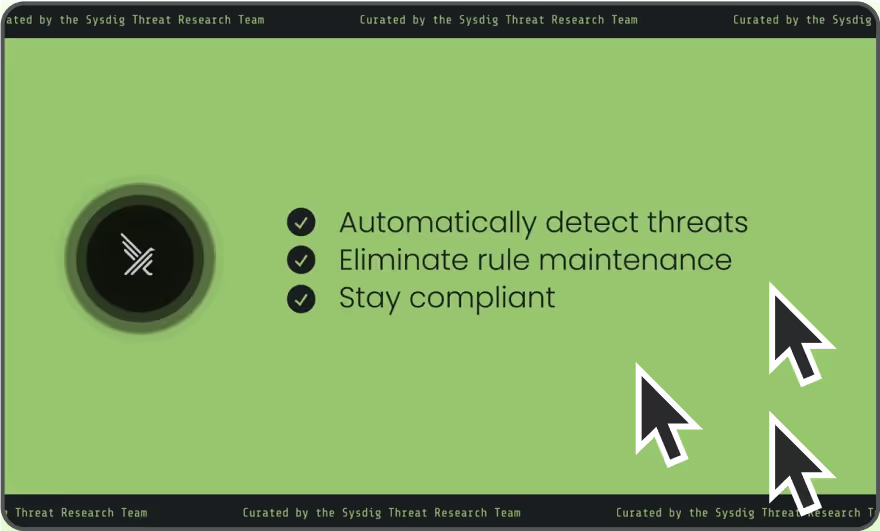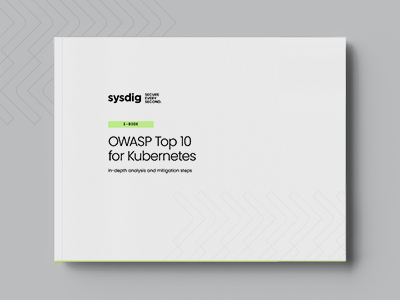
Falco Feeds extends the power of Falco by giving open source-focused companies access to expert-written rules that are continuously updated as new threats are discovered.

The recent discovery of a backdoor in XZ Utils (CVE-2024-3094), a data compression utility used by a wide array of various open-source, Linux-based computer applications, underscores the importance of open-source software security. While it is often not consumer-facing, open-source software is a critical component of computing and internet functions, such as secure communications between machines.
Open source software (abbreviated as OSS) has become a cornerstone of the tech industry, influencing everything from small startups to global corporations. Despite its ubiquitous presence and foundational role in driving innovation, the true economic value of OSS has remained largely uncharted territory—until now. A groundbreaking study entitled "The Value of Open Source Software" by researchers Manuel Hoffmann, Frank Nagle, and Yanuo Zhou at Harvard Business School delves into this unexplored domain, revealing the astonishing economic impact of OSS throughout industry.
A Priceless Foundation with a Trillion-Dollar Impact
The study begins by addressing a fundamental paradox: How do you measure the value of something that is freely available? Traditionally, economic value is calculated by multiplying the price of a product by the quantity sold. However, this formula hits a snag when it comes to OSS—there's no price tag on something that's free, and tracking its usage is a Herculean task due to the decentralised nature of OSS distribution.
Leveraging unique global data sources and a novel approach, the research estimates the "supply-side" value (the cost to recreate the most widely used OSS) at $4.15 billion. But the true eye-opener is the "demand-side" value, pegged at a staggering $8.8 trillion. This figure represents the hypothetical cost that companies would face if they had to develop equivalent software internally, highlighting the immense savings and efficiency gains OSS provides to the global economy.
For instance, Falco, an open-source, cloud-native security tool, boasts contributions from 190 individuals dedicated to enhancing the software and ensuring it meets the evolving threats in cloud computing. If an organisation attempted to develop a custom threat detection engine in Go from scratch, it would be financially impractical to employ 190 staff members to continuously develop and maintain the tool. Although most of the 190 contributors likely engage with Falco as a side project rather than their primary employment, acknowledging the number of people actively committing to the project offers valuable insight into its collective human investment.
The Unsung Heroes of OSS
One of the most intriguing findings of the study is the concentration of value creation within the OSS community. A mere 5% of OSS developers are responsible for 96% of its demand-side value. This elite group of contributors has a disproportionate impact on the software landscape, emphasising the need for support and recognition from both the tech industry and policymakers.
Sticking to the topic of the recent XZ Utils backdoor, to prevent incidents like that from recurring, policymakers and software vendors must take proactive steps to enhance the security and integrity of existing OSS projects. Many OSS maintainers work on these projects voluntarily, without compensation, and often in addition to their regular employment. This can lead to overwork and burnout, creating vulnerabilities that adversaries can exploit to compromise software.
Without adequate safeguards and support systems, these maintainers operate in an environment that undervalues their crucial contributions and exposes them to significant risks. To address these challenges, there is a pressing need for policy interventions that recognise and financially support OSS development, along with industry-wide adoption of rigorous security practices. By implementing measures such as funding OSS projects, offering security training for maintainers, and developing comprehensive review processes, policymakers and vendors can protect maintainers from undue pressures and enhance the security of OSS.
The Programming Languages That Power the Economy
Digging deeper, the study finds that the lion's share of OSS value is actually generated by a few key programming languages, with Go, JavaScript, and Java leading the pack. These languages are not just popular among developers; they are instrumental in creating billions of dollars in value, further emphasizing the strategic importance of investing in and nurturing the OSS ecosystem.
The notion of organisations opting to create proprietary programming languages rather than leveraging existing open-source options like JavaScript or Python libraries does not hold practical merit, considering the extensive resources and expertise required for such an endeavor.
Constructing a new programming language from scratch involves not just the immense initial development effort but also the continuous maintenance, development of libraries, tools, and community support to make it viable for production use. Moreover, the existing ecosystems around popular languages such as JavaScript and Python are the result of years of collective effort and contributions from a global community, encompassing vast libraries and frameworks that facilitate rapid development and deployment of applications.
These widely-used languages, however, are not without their vulnerabilities, including known Common Vulnerabilities and Exposures (CVEs) that pose significant security risks if left unpatched. Addressing these vulnerabilities often falls beyond the capacity of individual organisations, especially considering the breadth of open-source dependencies modern applications rely on. This scenario underscores the crucial role of large software vendors in enhancing the security infrastructure of the open-source ecosystem.
By contributing to the security of these languages and libraries, either through direct code contributions, funding, or the provision of advanced security tools and services, these vendors can significantly reduce the potential attack surface for organisations worldwide. Such collaborative efforts between individual maintainers, organisations, and large vendors are essential in bolstering the overall security posture of the open-source software that underpins much of today's digital infrastructure.
How is the Falco project staying secure?
The Falco project emphasizes its commitment to maintaining vendor independence and the collective effort to bolster its security posture. A foundational pillar of Falco's philosophy is its vendor-neutral stance, ensuring that the project benefits from a wide array of contributions without being tethered to any single company's interests. This approach has fostered a diverse and robust community, with significant engineering resources dedicated by several leading companies.
To prove the project's maturity and reliability, Falco successfully graduated from the Cloud Native Computing Foundation (CNCF) incubating status. This achievement was marked by a fairly rigorous Due Diligence process conducted by the CNCF Technical Oversight Committee (TOC), including a comprehensive third-party security audit. This graduation not only proved Falco's growth and sustainability, but also solidified Falco's position as a leader in the open-source runtime security ecosystem.
Reflecting on Falco's commitment to an inclusive development environment, Falco boasts contributions from 17 organizations actively committing to the project. Notably, approximately 38% of contributions originated from diverse committers affiliated with renowned organizations such as Amazon, Cisco, Chainguard, Clastix, IBM, Microsoft, RedHat, SecureWorks, among others, alongside many individual contributors. This collective effort also demonstrates how Falco's mission to foster a broad-based and resilient security tool is being enforced.
Governance practices further cement Falco's dedication to vendor neutrality, with specific measures to prevent any single entity from dominating the project's direction. A key governance rule caps any organization's eligible votes at 40%, ensuring balanced representation and decision-making within the project community.
Towards a Sustainable Future for OSS
Harvard's study revelations are a clear call to action to organisations to reflect on the value of OSS in their business, while also highlighting how many of those projects are taking appropriate steps to audit their projects. The paper further highlights the vital role of OSS in driving technological innovation and economic efficiency.
However, this digital commons, much like its physical counterparts, is vulnerable to overuse and underinvestment – as seen with the XZ Utils backdoor. The findings advocate for a concerted effort to support OSS development, ensuring its sustainability and continued contribution to the global economy.
"The Value of Open Source Software" study shines a spotlight on the hidden economic powerhouse that is OSS. By quantifying its value, the research not only celebrates the contributions of the OSS community but also highlights the critical need for strategic investment and support to secure its future. As we move forward in the digital era, the true value of OSS cannot be overstated—it is an indispensable resource that fuels innovation, drives efficiency, and shapes the technology landscape.



